美国文学Enlightenment
美国文学名词解释
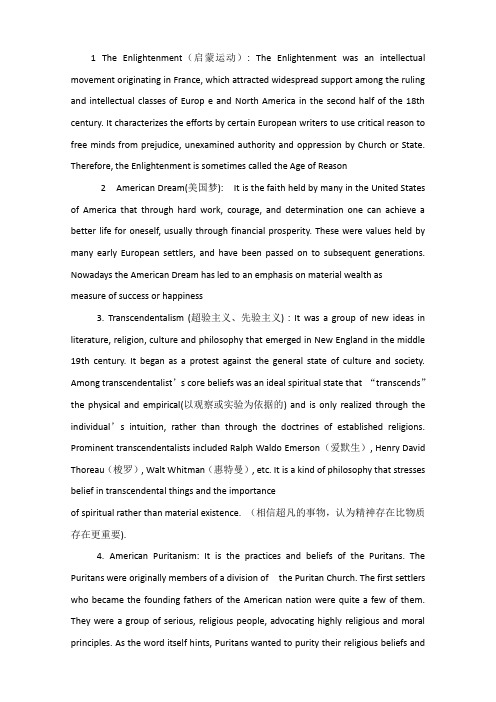
1 The Enlightenment(启蒙运动): The Enlightenment was an intellectual movement originating in France, which attracted widespread support among the ruling and intellectual classes of Europ e and North America in the second half of the 18th century. It characterizes the efforts by certain European writers to use critical reason to free minds from prejudice, unexamined authority and oppression by Church or State. Therefore, the Enlightenment is sometimes called the Age of Reason2 American Dream(美国梦): It is the faith held by many in the United States of America that through hard work, courage, and determination one can achieve a better life for oneself, usually through financial prosperity. These were values held by many early European settlers, and have been passed on to subsequent generations. Nowadays the American Dream has led to an emphasis on material wealth as measure of success or happiness3. Transcendentalism (超验主义、先验主义) : It was a group of new ideas in literature, religion, culture and philosophy that emerged in New England in the middle 19th century. It began as a protest against the general state of culture and society. Among transcendentalist’s core beliefs was an ideal spiritual state that “transcends”the physical and empirical(以观察或实验为依据的) and is only realized through the individual’s intuition, rather than through the doctrines of established religions. Prominent transcendentalists included Ralph Waldo Emerson(爱默生), Henry David Thoreau(梭罗), Walt Whitman(惠特曼), etc. It is a kind of philosophy that stresses belief in transcendental things and the importanceof spiritual rather than material existence. (相信超凡的事物,认为精神存在比物质存在更重要).4. American Puritanism: It is the practices and beliefs of the Puritans. The Puritans were originally members of a division of the Puritan Church. The first settlers who became the founding fathers of the American nation were quite a few of them. They were a group of serious, religious people, advocating highly religious and moral principles. As the word itself hints, Puritans wanted to purity their religious beliefs andpractices. They accepted the doctrine of predestination宿命论, original sin and total depravity性恶说, and limited atonement 有限的救赎through a special infusion 浸渍of grace from God. As a culture heritage, Puritanism did have a profound influence on the early American mind.:It is the writing technique of using symbols. It’s a literary movement that arose in France in the last half of the 19th century and that greatly influenced many English writer, particularly poets, of the 20th century. It enables poets to compress a very complex idea or set of ideas into one image or even one word. It’s one of the most powerful devices thatpoets employ in creation.novel is a type of romance very popular late in the 18th century and at the beginning of the 19th novel emphasizes things which are grotesque怪异的,violent,mysterious,supernatural,desolate 荒凉and horrifying. Gothic,originally in the sense of “medic医学,not classical”,with its descriptions of the dark,irrational side of human nature,Gothic novel has exerted a great influence over the writers of the Romantic period.8 Imagism: it’s a poetic movement of England and the flourished from 1909 to 1917. The movement insists on the creation of images in po etry by “the direct treatment of the thing” and the economy of wording. The leaders of this movement were Ezra Pound and Amy Lowell艾米•洛威尔.8. Imagism: It came into being in Britain and around 1910 as a reaction to the traditional English poetry to express the sense of fragmentation and dislocation. The imagists, with Ezra Pound leading the way, hold that the most effective means to express these momentary impressions is through the use of one dominant image. Imagism is characterized by the following three poetic principles: direct treatment of subject matter; economy of expression; as regards rhythm, to compose in the sequence of the musical phrase, not in the sequence of metronome节拍器. Pound’s “In a Station of the Metro”is a well-known imagist poem.9. Stream of Consciousness(意识流): It is a style used in the presentation of the character’s inner working of mind. The assumption is that an individual’s psychological processes are a continuous flow like a shifting, uninterrupted stream, highly changeable and confusing, often appearing illogical and contrary to reason. In tracing the stream of consciousness of an individual the writer may present interior monologue(内心独白) by his character, hint with symbols, reverse(颠倒) the order of time, and alternate(轮流的/交替的)recollections(回忆)with the present or sometime illusions(幻想)with given facts.10. Point of view( 视角):It is a term referring to the vantage point(能观察某事物的有利位置) or position from which a story is told. To identify(识别)the narrator of a story is to identify the story’s point of view. Basically there are two narrative ways: first-person point of view and the third-personpoint of view.12. The Harlem Renaissance: it was the first important movement in black American literature. Immediately after the First World War, as a result of a massive black migration to Northern cities, a group of young, talented black artists congregated in Harlem, a predominantly black section of New York City, and made it the cultural, and intellectual capital of black America. They carried forward the cultural traditions of their people and demonstrated their achievements to the white society that habitually ignored them.13. Expressionism 表现主义: it arouse in German theater after World War I. Delighting in bizarre (奇异的) stage design and exaggerated makeup and costuming(服装), expressionists sought to reflect intense states of emotion. Its mode is “the externalization(外表性) of t he inner.”humor: It is a combination of humor with resentment(怨恨), gloom, anger, and despair. Seeing all that is unreasonable, hypocritical, ugly, and even frenzied(狂乱的),writers of black humor nurse a grievance(不平) against their society which, according to them, is full of institutionalized(制度化的) absurdity. Yet they are cynical. They laugha morbid(病态的) laugh when facing the hideous(丑恶的). In hopeless indignation (愤慨)they take up freezing irony and burning satire as their weapons. Their novels are often in the form of anti-novel(反传统小说), devoid of(缺乏) completeness of plot and characterized by fragmentation(零碎的)and dislocation(混乱).。
理性和革命时期美国文学
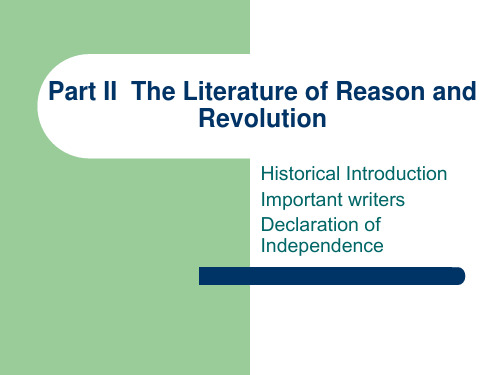
(1) colonies (2) states (3) federal republic--- the United States of America
II. Enlightenment
Noah Webster & His Dictionary of the English Language
III. Literature
2. While imaginative literature (富有想象力的文学作 品,fiction, mythology, poetry, drama, etc ) in America remained derivative (派生的;拷贝的) and dependent, the heroic and revolutionary ambitions of the age had created great political pamphleteering (小册子) and state papers. Essayists and journalists had shaped the nation’s beliefs with reason dressed in clear and forceful prose.
I. The American War for Independence 1775-1783
(1) 1775, Lexington, beginning of the Independence War (2) July 4, 1776, Thomas Jefferson, Declaration of Independence (3) 1778, alliance with France, turning point for American army (4) 1778, English army surrendered (5) 1783, formal recognition by the British government
the American Enlightenment美国启蒙运动 文学

The War for Independence (1775-1783)
The hard-fought American Revolution against Britain was the first modern war of liberation against a colonial power. Military victory fanned nationalistic hopes for a great new literature. With the country’s independence, the beginnings of literary independence were evident in some writings. Yet American literature throughout the century was largely patterned on the writing of the eighteenth-century Englishmen. Except for the outstanding political writing, few works of note appeared during or soon after the Revolution.
The Age of Enlightenment
Features of the American Enlightenment
The War for Independence Characteristics of the literature
THE AMERICAN ENLIGHTENMENT
The 18th-century American Enlightenment was a movement marked by an emphasபைடு நூலகம்s on rationality rather than tradition, scientific inquiry instead of unquestioning religious dogma, and representative government in place of monarchy. Enlightenment thinkers and writers were devoted to the ideals of justice, liberty, and equality as the natural rights of man. Deism(自然神论) :the belief, based solely on reason, in a God who created the universe and then abandoned it, assuming no control over life, exerting no influence on natural phenomena, and giving no supernatural revelation.
美国文学术语解释
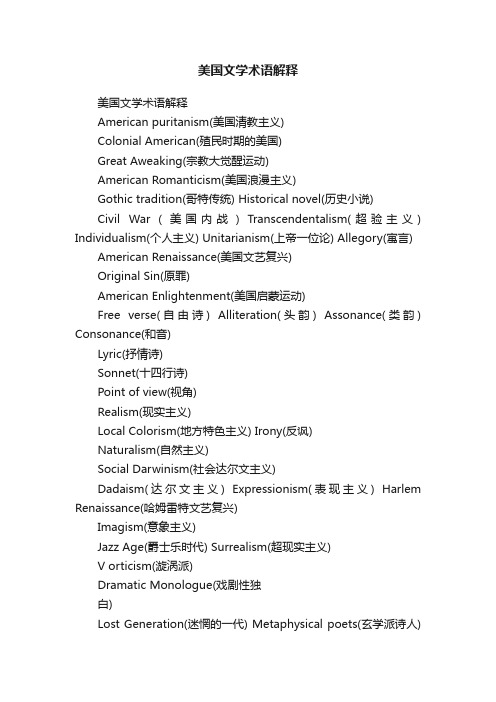
美国文学术语解释美国文学术语解释American puritanism(美国清教主义)Colonial American(殖民时期的美国)Great Aweaking(宗教大觉醒运动)American Romanticism(美国浪漫主义)Gothic tradition(哥特传统) Historical novel(历史小说)Civil War(美国内战)Transcendentalism(超验主义) Individualism(个人主义) Unitarianism(上帝一位论) Allegory(寓言) American Renaissance(美国文艺复兴)Original Sin(原罪)American Enlightenment(美国启蒙运动)Free verse(自由诗) Alliteration(头韵) Assonance(类韵) Consonance(和音)Lyric(抒情诗)Sonnet(十四行诗)Point of view(视角)Realism(现实主义)Local Colorism(地方特色主义) Irony(反讽)Naturalism(自然主义)Social Darwinism(社会达尔文主义)Dadaism(达尔文主义) Expressionism(表现主义) Harlem Renaissance(哈姆雷特文艺复兴)Imagism(意象主义)Jazz Age(爵士乐时代) Surrealism(超现实主义)V orticism(漩涡派)Dramatic Monologue(戏剧性独白)Lost Generation(迷惘的一代) Metaphysical poets(玄学派诗人)Narrator(叙述者)Stream of Consciousness(意识流) The Beat Generation(垮掉的一代) The 1930s(美国30年代)New Criticism(新批评主义) Theatre of the Absurd(荒诞剧) Postmodernism(后现代主义) Metafiction(元小说) Confessional poetry(自白派诗歌) The New York School(纽约派诗人)The absurd(荒谬派)Parody(戏讽)Magic realism(魔幻现实主义) The National Association for the Advancement of ColoredPeople(NAACP)(美国有色人种协进会)The Native American Renaissance(土著美国人文艺复兴)。
美国文学名词解释整理版
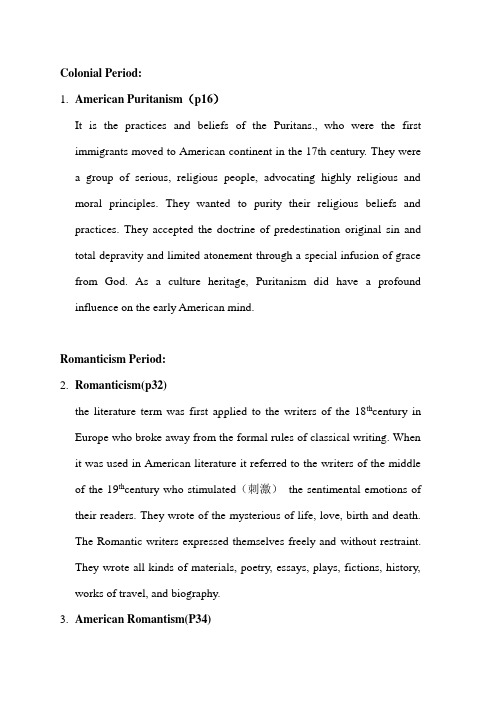
Colonial Period:1.American Puritanism(p16)It is the practices and beliefs of the Puritans.,who were the first immigrants moved to American continent in the 17th century. They werea group of serious, religious people, advocating highly religious andmoral principles. They wanted to purity their religious beliefs and practices. They accepted the doctrine of predestination original sin and total depravity and limited atonement through a special infusion of grace from God. As a culture heritage, Puritanism did have a profound influence on the early American mind.Romanticism Period:2.Romanticism(p32)the literature term was first applied to the writers of the 18th century in Europe who broke away from the formal rules of classical writing. When it was used in American literature it referred to the writers of the middle of the 19th century who stimulated(刺激)the sentimental emotions of their readers. They wrote of the mysterious of life, love, birth and death.The Romantic writers expressed themselves freely and without restraint.They wrote all kinds of materials, poetry, essays, plays, fictions, history, works of travel, and biography.3.American Romantism(P34)①it is one of the most important periods in the history of American literature that stretches from the 18th century to the outbreak of the civil war. It started with the publication of Washington Irving‟s The Sketch Book and ended with Walt Whitman‟s Leaves of Grass.②being a period of the great flowering of American literature, it is also called “the American Renaissance ”.③American romantic works emphasize the imaginative and emotional qualities of nature literature. The strong tendency to eulogize the individual and common man was typical of this period. Most importantly, the writings of American Romanticism are typically American. Works concentrate on unique characteristics of the American land.⑤Romanticists include such literary figures as Washington Irving, Ralph Waldo Emerson, Henry David Thoreau, William Cullen Bryant, Henry Wordsworth Longfellow, Nathaniel Hawthorne, Edgar Allan Poe, Herman Melville, Walt Whitman and some others.4.Gothic tradition (哥特传统)Gothic novel or Gothic romance is a story of terror and suspense, usually set in a gloomy old castle or monastery very popular late in the 18th century and at the beginning of the 19th century.In an extended sense, many novels do not have a medievalzed setting, but share a comparably sinister, grotesque, or claustrophobic atmosphere have been classed as Gothic. It contributed to the new emotional climate of Romanticism.5.Transcendentalism (先验说,超越论)(p47)It is a philosophic and literary movement that flourished in New England, particular at Concord, as a reaction against Rationalism and Calvinism (理性主义and喀尔文主义). Mainly it stressed intuitive understanding of God, without the help of the church, and advocated independence of the mind,stress the importance of the Over-soul, the Individual and Nature.The representative writers are Emerson and Thoreau.6.Stream of consciousness(意识流):It is one of the modern literarytechniques. It is the style of writing that attempts to imitate the natural flow of a character‟s thoughts, feelings, reflections, memories, and mental images as the character experiences them. It was first used in 1922 by the Irish novelist James Joyce. Those novels broke through the bounds of time and space, and depicted vividly and skillfully the unconscious activity of the mind fast changing and flowing incessantly。
美国文学名词解释
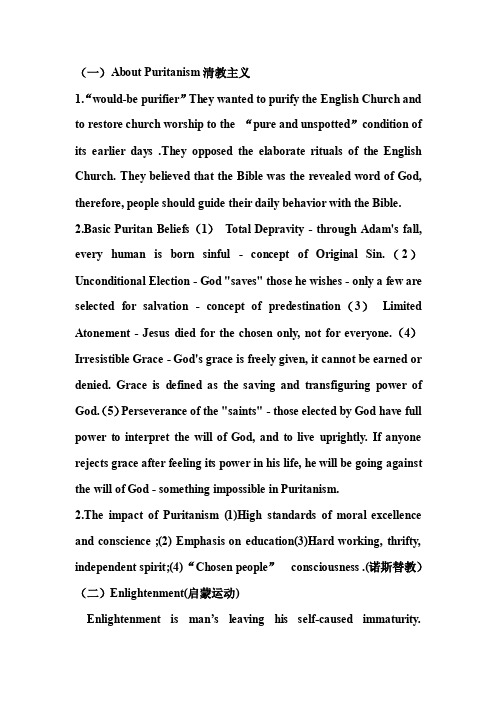
(一)About Puritanism清教主义1.“would-be purifier”They wanted to purify the English Church and to restore church worship to the “pure and unspotted”condition of its earlier days .They opposed the elaborate rituals of the English Church. They believed that the Bible was the revealed word of God, therefore, people should guide their daily behavior with the Bible.2.Basic Puritan Beliefs(1)Total Depravity - through Adam's fall, every human is born sinful - concept of Original Sin.(2)Unconditional Election - God "saves" those he wishes - only a few are selected for salvation - concept of predestination(3)Limited Atonement - Jesus died for the chosen only, not for everyone.(4)Irresistible Grace - God's grace is freely given, it cannot be earned or denied. Grace is defined as the saving and transfiguring power of God.(5)Perseverance of the "saints" - those elected by God have full power to interpret the will of God, and to live uprightly. If anyone rejects grace after feeling its power in his life, he will be going against the will of God - something impossible in Puritanism.2.The impact of Puritanism (1)High standards of moral excellence and conscience ;(2) Emphasis on education(3)Hard working, thrifty, independent spirit;(4)“Chosen people”consciousness .(诺斯替教)(二)Enlightenment(启蒙运动)Enlightenment is man’s leaving his self-caused immaturity.Immaturity is the incapacity to use one's intelligence without the guidance of another.@A term used to describe the trends in thought and letters in Europe and the American colonies during the 18th century prior to the French Revolution. The precursors of the Enlightenment can be traced to the 17th century and earlier.@The phrase was frequently employed by writers of the period itself, convinced that they were emerging from centuries of darkness and ignorance into a new age enlightened by reason, science, and a respect for humanity.(三)Romanticism (浪漫主义)As an approach in literary creation, romanticism is ever present in literature of all times. But as a literary trend or movement, it occurred and developed in Europe and America at the turn of the 18th and 19th centuries under the historical background of the Industrial Revolution around 1760 and the French Revolution (1789-1799). @ A movement in the literature of virtually every country of Europe, the United States, and Latin America that lasted from about 1750 to about 1870,@It was characterized by reliance on the imagination and subjectivity, freedom of thought and expression, and an idealization of nature.(四)Transcendentalism(超验主义)Transcendentalism is the summit of the Romantic Movement in theU.S. in the first half of the 19th century. It asserts the existence of an ideal spiritual reality that transcends the empirical and scientific and is knowable through intuition .Transcendentalists place emphasis on the importance of the Over-soul, the individual and Nature. It was, in essence, romantic idealism on Puritan soil.(五)Free versepoetry without a fixed beat or regular rhyme scheme.(六)Blank verse“Blank verse” is poetry written in regular metrical but unrhymed lines, almost always iambic pentameters.(七)American Realism (1865—1918)(现实主义)American Realism came in the latter half of the nineteenth century as a reaction against Romanticism. It stresses truthful treatment of material. It focuses on commonness of the lives of the common people, and emphasizes objectivity and offers an objective rather than an idealistic view of human nature and human experience. The three dominant figures of the period are William Howells, Mark Twain, and Henry James.(八)Definition of Local Color(乡土特色)1.Literature that focuses on the characters, dialect, customs, topography(地形), and other features particular to a specific region that exploits the speech, dress, mannerisms, and habits of thatspecific region .2.Twain’s Local colorismTwain preferred to present social life through portraits of the local characters of his regions, including people living in that area, the landscape, and other peculiarities like the customs, dialects, costumes and so on. So the rich material of his boyhood experience on the Mississippi became endless resources for his fiction, and the Mississippi valley and the west became his major theme.(九)American Naturalism (1890s-1910s) (自然主义)1.Historical Background:—The spread of industrialization created extremes of wealth and poverty. —Farmers were still going westward, but frontiers were about the close. They had to depend on the transcontinental railway to transport their products.—The spread of Darwin’s theory of evolution changed people’s ideology.2. Thematically, naturalistic writers:-- wrote detailed descriptions of the lives of the downtrodden and of the abnormal-- had frank treatment of human passion and sexualit-- were concerned about how men and women were overwhelmed by the forces of environment and by the forces of heredity-- made detailed documentation of life: nothing but the truth, more naked and wicked than realism-- created gloomy and pessimistic atmosphere3. Here are the major features of naturalism.Humans are controlled by laws of heredity and environment.The universe is cold, godless, indifferent and hostile to human desires. @Naturalistic writers are pessimistic. They choose their subjects from the lower.(10)Modernism(现代主义)(1)appeared after World War I(2)cutting off history and a sense of despair and loss(3)refusing to accept the traditional concept of value and all traditional ideological influences.1. BackgroundIn the first world war, America got considerable benefits with animal cost, but many artist and thinkers with suffering consciousness felt the terribleness of modern wars.Their heroism in mind gradually disappeared. Some of them going into battle suffered the sight of blood and all kinds of disasters. After back to America, they found that the social reality had experienced great change.2.Features or changes of the period(1)Increasing industrialization (2)Deepening urbanization(3)High speed development of technology and science(4 )Trauma of the first world war(5)1930s economic depression(6)Collapse of social value system(7)Dropping moral standards(8)Common depression , fear ,sense of loss3. Features of the worksFreud’s psychoanalysis ,William James stream of consciousnesstheory and archetypal symbol had great impact on the writers of modern American writers. They pay special attention to the inner world of the people, during this period ,the most compelling literature movement is the writer’s self exile, also known as the second American renaissance .(十一)Novelists ——the Lost Generation“迷惘的一代”(1920s) The novelists who produced a literature of disillusionment in the aftermath of World War I, and some of them lived abroad:(1)Used their wartime experience as the basis for their works (2)were cut off from old values yet unable to come to terms with the new era(3)wondered pointlessly and restlessly(4)were frustrated by the war(5)spokesman ——Hemingway(十二)The Jazz AgeThe Jazz Age is the nickname in America of the decade of the 1920’s, beginning from 1919 to the Crash at the end of 1929.These ten years were, for Americans, a time of carefree prosperity, isolated from the world’s problem, bewildering great social change, and a feverish pursuit of pleasure.These were the ten years when the First World War was just over, when new inventions and manufacturing techniques greatly changed the way people lived; when people moved from the countryside in great numbers; when women won the right to vote and many started to earn their own money; when cars,washing machines,radios and vacuum cleaners became commonplace; and when millions of people lived beyond their means and went into debt in order to obtain such things while the middle class frantically pursued individual “success”and personal enjoyment. They lived a rich, extravagant, frivolous moneymaking life, and it was this style of living gave the decade of the 1920’s such nickname as the “Jazz Age”, the “Dollar Decade”, and the “Roaring Twenties.”(十三)Imagism(1900S-1910S)(意象派)The Imagist movement included English and American poets in the early twentieth century who wrote free verse and were devoted to "clarity of expression through the use of precise visual images." The Imagist Movement began in London and later spread to the US. It underwent three major phases in its development.(十四)IronyA contrast or discrepancy between what is said and what is meant or between what happens and what is expected to happen in life and in literature.。
American Enlightenment__ Literature(美国文学)
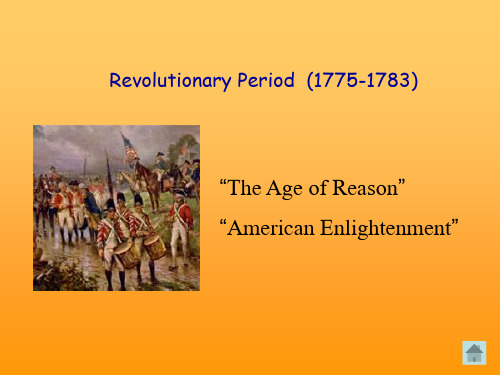
3. Evaluation The Autobiography is a record of selfexamination and self-improvement. Benjamin Franklin was a spokesman for the new order of the 18th century enlightenment The Autobiography is a how-to-do-it book, a book on the art of self-improvement. (for example, Franklin’s 13 virtues) Through telling a success story of self-reliance, the book celebrates, in fact, the fulfillment of the American dream. The Autobiography is in the pattern of Puritan simplicity, directness, and concision.
1. Benjamin Franklin (1706-1790)
1. Works
《自传》
《格言历书》
• The Autobiography • Poor Richard’s Almanack 2. Life
Benjamin Franklin came from a Calvinist background. He was born into a poor candle-maker’s family. He had very little education. He learned in school only for two years, but he was a voracious reader. At 12, he was apprenticed to his elder half-brother, a printer.
美国文学史选读整理第一部分殖民地时期的文学
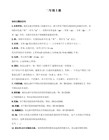
第一部分殖民地时期的文学17世纪历史文化背景1.17世纪早期,英国人最终在弗吉尼亚Virginia和马萨诸塞Massachusetts定居,奠定了人们熟知的美国主流文化的基础2.The first writings that we call American were the narratives and journals of these settlements.3.The first permanent English settlement in North America was established at Jamestown, Virginia in 1607.4.New England: 美国东北部地区,范围包括缅因州,新罕布什尔,佛蒙特,马萨诸塞,罗得岛和康涅狄格。
1614年由英国人John Smith命名。
5.Jamestown: 北美洲英国第一个永久性殖民地,建于1607.5.14.这里最先种植烟草,建立了大陆上第一个代议制政府(1619),运进第一批非洲奴隶,建立了美洲第一个圣公会教堂。
6.John SmithWilliam Byrd II:文学巨匠,《分界线的历史》Thomas Jefferson: 政治型学者,美国第三任总统,《独立宣言》的主要起草人,《英属美洲权利概述》(1774):英国国会无权为殖民地制定法律;《弗吉尼亚笔记》:种族问题。
美国第一位作家:Captain John Smith1.<A True Relation of Such Occurrences and Accidents of Note as Hath Happened in Virginia Since the FirstPlanting of That Colony>16082.<A Map of Virginia>1612(第二本书,共出版了8本书,部分记载了关于新英格兰的事)3.<General History of Virginia>1624有关于酋长之女波卡洪特斯Pocahontas的故事早期新英格兰文学:1.勤劳hard work、节俭thrift、虔诚piety、节制sobriety2.The Puritans had come to New England for the sake of religious freedom, while Virginia had been plantedmainly as a commercial venture.3.清教传教士:John Cotton约翰·科登,Cotton Mather科登·马瑟William Bradford and John Winthrop1.Plymouth: 普利茅斯,北美第二个英国殖民地,1620五月花号抵达地2.威廉·布拉德福德(1590-1657):<The History of Plymouth Plantation>(普利茅斯开发史)From my years young in days of youth那时我青春年少懵懂无知God did make known to me His Truth上帝眷顾教我真理And call’d me from my native place蒙他召唤我离开家乡For to enjoy the Means of Grace矢志追寻他的荣光In wilderness He did me guide苍茫大地他给我指引And in strange lands for me provide陌生土地终归我统领……As Pilgrim passed I to and fro.我作为清教徒而来,我作为清教徒而去3.约翰·温思罗普(1588-1649):<The History of New England>(新英格兰史)清教徒的思想1.As the word itself hints, Puritans wanted to make pure their religious beliefs and practices. The Puritan wasa “would-be purified.”2.The Puritans wished to restore simplicity to church services and the authority of the Bible to theology.3.Separatists—they wished to break free from the Church of England.4.Emphasize the image of a wrathful God and to forget his mercy.Anne Bradstreet and Edward Taylor清教徒诗人1.安妮·布雷兹特里特(1612-72):<The Tenth Muse Lately Sprung Up in America>(在美洲诞生的第十个缪斯); <Upon the Burning of Our House>; 《沉思录》;《疲乏的朝圣者》2.爱德华·泰勒(1642-1729):清教徒诗人中最杰出的一位。
- 1、下载文档前请自行甄别文档内容的完整性,平台不提供额外的编辑、内容补充、找答案等附加服务。
- 2、"仅部分预览"的文档,不可在线预览部分如存在完整性等问题,可反馈申请退款(可完整预览的文档不适用该条件!)。
- 3、如文档侵犯您的权益,请联系客服反馈,我们会尽快为您处理(人工客服工作时间:9:00-18:30)。
--- We hold these truths to be self-evident, that all men are endowed by their Creator with certain unalienable Rights, that among these are Life, Liberty, and the pursuit of Happiness. ---
It is a statement of American principles and a review of the Causes of the quarrel with Britain, presented the American view to the world with classic dignity. It instilled among the common people a sense of their own importance and inspired struggle for personal freedom, self government and a dignified place in society.
Philosophical and intellectual movement. Originated in Europe The 18th-century American Enlightenment was a movement marked by an emphasis on rationality rather than tradition, scientific inquiry instead of unquestioning religious dogma, and representative government in place of monarchy. Enlightenment thinkers and writers were devoted to the ideals of justice, liberty, and equality as the natural rights of man. The colonists who would form a new nation were firm believers in the power of reason; they were ambitious, inquisitive, optimistic, practical, politically astute, and self-reliant.
Historical Introduction (2)
Spiritual life of the colonies—Enlightenment. Resources: Newton‘s theory; deism; French philosophy (Rousseau, Voltaire) Basic principles: stressing education; stressing Reason (Order) ; employing Reason to reconsider the traditions and social realities; concerns for civil rights, such as equality and social justice
Enlightenment
Significance: accelerating social progress; freeing people from the limitations set by prevailing Puritanism; making spiritual preparation for American Revolution Influence on literature In form: imitating English classical writers In content: utilitarian tendency (for political or educational purpose) Representatives: Benjamin Franklin, Thomas Paine, Thomas Jefferson etc.
and to assume among the powers of the earth, the separate and equal station to which the Laws of Nature and of Nature‘s God entitle them, a decent Respect to the opinions of mankind requires that they should declare the causes which impel them to the separation.
Chapter Two
Revolutionary Period (1775-1783)
―The Age of Reason‖ ―American Enlightenment‖
In the 18th century, people believed in man‘s own nature and the power of human reason. With Franklin as its spokesman, the 18th century America experienced an age of reason. Words had never been so useful and so important in human history. People wrote a lot of political writings. Numerous pamphlets and printings were published. These works agitated revolutionary people not only in America but also around the world.
2. Philip Freneau (1752-1832)
“Poet of the American Revolution” “Father of American Poetry” “Pioneer of the New Romanticism” “A gifted and versatile lyric poet”
Jeffersonian Democracy
faith in the individual and common man, dislike an overly strong government, and emphasis on the importance of education and on agrarianism and land ownership as they brought responsibility and true judgment. Politically, he is considered the father of the democratic spirit in his country. The society he thought of as ideal was one where landowning farmers could live under as little government as possible. Style: dignity, flexibility, clarity, command of generalization
The Declaration of Independence
The essay, adopted July 4, 1776, not only announced the birth of a new nation, but also set forth a philosophy of human freedom which served as unimportant force in the western world.
Part II. Historical Introduction(1)
Industrial Revolution(1750-1830): spurred the economy in American colonies. Independence War: the industrial growth led to intense strain with Britain. The British government tried to suppress their growth economically, and ruled them from abroad politically and levied heavy tax on them. these aroused bitter resentment in colonies. Constant conflicts resulted in American revolutionary war.
Thomas Paine 1737-1809(1)
Propagandist, pamphleteer, a master of persuasion who understands the power of language to move a man to action. Main works: Common Sense The American Crisis The rights of man The Age of Reason
That to secure these rights, Governments are instituted among men, deriving their just powers from the consent of the governed, ---That whenever any form of Government becomes destructive of these ends, it is the Right of People to alter or to abolish it, and to institute new Government…
